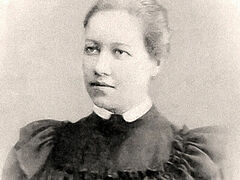This publication was prepared by V. P. Bykov. He spoke during the war years [WW1] with many wounded soldiers in the military medical units that had been set up in great numbers practically throughout the country [Russia]. “This happened in the Kaluga medical unit that had been set up in the women’s high school. After my talk on the words of the prayer to the Holy Spirit, ‘and Giver of life’, one of the soldiers, peasant from Penza Governate I. A. R-kov, with tearful eyes and barely able to hold back his emotions, told us the following:
“‘When I was called to service as a soldier in the first militia in the Russian army, I literally didn’t believe in anything. The factory environment all around me from my early youth had torn from my consciousness all of the childhood faith that had been inculcated into me from a young age. And it had torn it out so thoroughly that it seemed nothing could return me to the faith of my childhood years—not even to the faith that the adults in my family, my village had… Now I only knew one thing—that our faith itself, our religion, church, prayers, and holy shrines were all nothing more than total fiction… It was with this worldview that I came home, in order to say goodbye to my family before the callup. It was especially burdensome for me and offensive, I repeat “offensive”, when my elderly mother, who loves me with all her heart, made the sign of the cross over me for the last time. With her eyes full of tears, she suddenly opened the collar of her dress, took out from it on a thick chain a large, old copper cross, green with age, an inch wide and two inches in length. On one side of the cross was a relief image of the crucified Savior, and on the other side was an image, also relief, of the Most Pure Mother of God, “Joy of All Who Sorrow.” And so my mother put it around my neck… I clearly felt that something bad had been put around my neck, that some sort of heavy, iron plate lay on my chest. My first movement was to take advantage of the general confusion and take off this maternal blessing. And that is what I did.
“‘At first everything went fine. About five days later, when I heard the first whistle of a stray bullet near me, I saw how all the soldiers in our trench carefully pulled out their crosses and little icons—their parents’ blessings—from their breasts. They crossed themselves with them, venerated them. Unwillingly following their example I also took my cross from my pocket, and with a feeling more akin to dread than faith, kissed it and hung it around my neck. Not for a minute did I expect any sort of miracle from my cross, to the contrary I kicked myself for my weakness in submitting to some herd instinct and hanging on my own neck what had no value for me whatsoever. More than once did I have the urge to take the cross off again and put it back in my pocket, but I somehow didn’t have the gumption to do it in front of my comrades, and anyway the bullets kept flying … and there was no time for it. In less than two hours there was nothing left of our trench. When I came to, without even opening my eyes … I heard someone speaking in Polish next to me—I know the Polish language well. “Alive or dead?” “No, looks like he’s breathing.” “Why didn’t you finish him off and go on?” “I couldn’t do it, because he’s wearing a cross… It means he has a Christian soul…” When I opened my eyes I saw myself lying between unending rows of corpses, and two Austrian soldiers were walking away from me. I again fell into a deep faint. My second awakening came in the bandaging tent… The doctor said, “Well my dear, pray night and day to your cross. If it weren’t for it taking on the stray bullet, you would have been dead meat. The bullet was headed straight for you heart.”
“‘I remembered as if in a dream what I had heard there between the dead bodies, and was barely able to tell the good doctor that this cross had saved me twice from impending death… And now,’ the man ended his story, taking his copper cross, bent from the bullet, from his breast, ‘no one will ever again be able to tear from my heart my deep faith in this sacred image, in the holy life-giving cross, and in my parents’ blessing.’”
A. Farberov, Intercessions of the Mother of God for Russian soldiers in the Great War, 1914. The August icon of the Mother of God (Moscow: Kovcheg, 2010).
From the book, War and Faith
(Moscow: Volny Strannik/Fond Traditsia, 2019)
Translation by OrthoChristian.com




